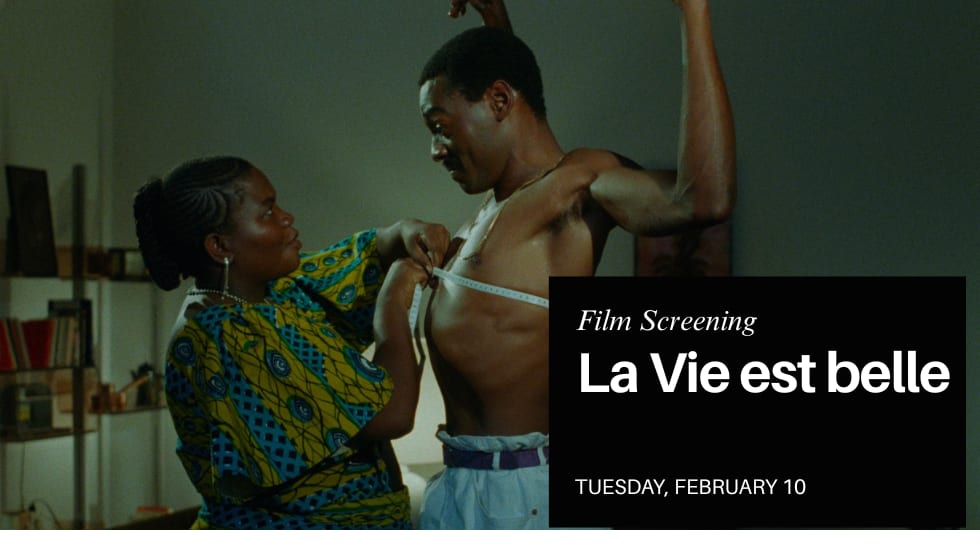
Film Screening: Cinémélodie—Les États-Unis d'Afrique & La Vie est belle
In celebration of Black History Month
6:30 p.m. Tuesday, February 10
Julius Lewis Auditorium (54 W Chicago Ave)
In French with English subtitles
Free for Members & Students (w/.edu email or student ID) · $5 for GSFC Members (w/member card) · $15 for Non-Members
This event has passed
Cet évènement est passé
Description
Join us for the next installment in our 2025/2026 music-themed film series, Cinémélodie: a screening of two films highlighting the African continent, in celebration of Mois de l’histoire des Noirs (Black History Month).
This double feature begins with a screening Québécois film producer Yanick Létrouneau’s 2011 medium-length documentary Les États-Unis d’Afrique (The United State of Africa), followed by Congolese filmmaker Mwezé Ngangura’s 1988 feature-length comedy *La Vie est belle (Life Is Beautiful).*
The films will be presented by freelance film programmer Charles Coleman, who will lead a Q&A after the screening.
Guests will enjoy a pre-reception featuring a complimentary glass of Louis Jadot Bourgogne, as well as the chance to win a $50 gift certificate to the Sofitel Magnificent Mile’strès chic Le Bar.
Doors at 6:00 p.m. for wine reception. Program at 6:30. Please enter via 54 W Chicago Ave. Non-alcoholic options will be available.
About the Films
Les États-Unis d’Afrique (Yanick Létrouneau, 2011, 75 minutes)—Létrouneau’s medium-length documentary follows the quest of African hip-hop pioneer Didier Awadi in the creation of an album in hommage to the Black Consciousness Movement leaders who fought for the ideal of a united and independent Africa. This epic musical and political journey leads him to over 40 countries, where he collaborates with activist hip-hop artists such as Smockey (Burkina Faso), M1 of Dead Prez (United States), and ZuluBoy (South Africa).
La Vie est belle (Mwezé Ngangura, 1988, 83 minutes)—Ngangura’s feature length comedy follows Karou, a young Zairean farmer who dreams of making music and earning a living doing any job he can find. He travels to Kinshasa, the capital, with his cousin Mongali. During the journey, Kourou falls in love with a young woman named Kabibi. Finding work as a servant, he doesn’t yet know that his boss, Nvouandou, is also captivated by Kabibi. The boss will do anything to prevent Kabibi and Kourou from being together…
About the Presenter

Charles Coleman is the former Film Program Director of Facets Film Forum and now works as a freelance film programmer specializing in new and classic foreign films, as well as independent cinema. He has taught film courses at the University of Chicago and brings more than twenty years of experience in film programming and related fields. Charles is known for introducing rare, one-of-a-kind screenings to Chicago, curating retrospectives of acclaimed filmmakers, and championing the latest work of emerging directors. He has also lectured at the Chicago Public Library and the Art Institute and stays current with global film trends, key filmmakers, and new developments from international festivals and programs.
About the Directors
 Photo by CILO/Gamma-Rapho via Getty Images
Photo by CILO/Gamma-Rapho via Getty Images
Mwezé Ngangura (born 7 October 1950) is a film director from the Democratic Republic of the Congo (DRC) based in Belgium. Considered a pioneer of Congolese filmmaking, he is known for the classic La Vie est Belle (1987), the first feature film made in the DRC. BHe is founder of production company Soleil Films and Films du Sud, an organization that promotes intercultural communication and North-South audiovisuelle cooperation.
 RDVCanada.ca
RDVCanada.ca
Yanick Létourneau is a Canadian film producer and co-founder and head of Peripheria Productions. He is most noted as a producer of the documentary film Gulîstan, Land of Roses, which was a Canadian Screen Award nominee for Best Feature Length Documentary at the 5th Canadian Screen Awards in 2017, and the narrative feature film Night of the Kings (Le Nuit des rois), which was a CSA nominee for Best Picture at the 10th Canadian Screen Awards in 2022.
Getting Here
The Alliance Franaise de Chicago is one block from the CTA Red line stop at Chicago Ave. Best bus routes are the 22 on Clark and the 66 on Chicago Ave. A Divvy station is located in front of the 54 W Chicago Ave entrance.
Parking Information
$12 for 12 hours at InterPark at 100 W Chestnut St. Validation is available at reception.
Please be advised that students, members, and attendees at cultural events or programs may be photographed, and these images may be used for marketing purposes.
Share this page

